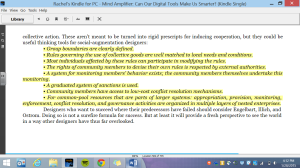In my opinion, one of the most interesting ideas from my final reading of Howard Rheingold’s Mind Amplifier: Can Our Digital Tools Make Us Smarter? (2012) is the suggestion of application of collective action principles to digital tool use. Collective action between humans relies on several principles—eight as established by political scientist Elinor Ostrom—for a successful outcome, ranging from clear group boundaries to a self-regulated monitoring system to the availability of low-cost conflict resolution mechanisms. The manifestation of these various principles can range widely in their execution (Ostrom looked at a variety of microcosms, from police systems to water-sharing agreements), but her data demonstrated that these are the shared characteristics in successful endeavors through collective action. While Rheingold does not explore how these principles might relate to digital tools, it seems that Internet use, collective action ultimately being its theoretical underpinning, relies on many of these principles. This suggests a reason for wikis incredible success as well as provides guidance for future use.
With relation to my own learning, part of my enjoyment of this set of ideas from the reading is due to its sociological nature. I enjoy seeing the larger themes of human existence at play, particularly when researchers and scientists are able to parse out these broad pieces of information for more ‘real-world’ application. For myself, learning about the abstract philosophy of collection action provides me with a stronger foundation about it general; I tend to be more of a deductive thinker in that regard. I am also fascinated by the continuously emerging brilliance of the social sciences in general.
When I consider what my learning of this information means for my students, I see that a lot of Ostrom’s proposed principles, although intended for a macroscopic approach, can definitely be applied as I consider what kinds of collective action I can engage my students in. In particular, these ideas make me reflect about how I am not only responsible for teaching my students about my content area, but also how to interact successfully with other people. How can I set up my own systems of collective action so that my students are provided with opportunities to practice skills that are clearly increasingly more important? I am starting to see that there are a variety of skill sets under the branch of technology that I will need to provide my future students. They will need to learn how to engage in collective action through digital tools, how to be able to find and use information they are seeking, how to be responsible digital citizens. One specific ways that I could incorporate this new information is the inclusion of a wiki project that uses some of Ostrom’s principles. I was actually required to complete one for a previous course and actually found that the collaboration was more successful than other group projects I have completed in the past.
One thing I have discovered this week about the eReader is its neat function of providing a citation each time I copy and paste a quote from the readings. As I synthesis information when writing, I tend to take the pieces of information that I want from a text, post them into my document, and weave the ideas (with citations) and my commentary on them together. I simply find it easier to have the ideas I want to include within the document as I begin to shape my ideas. So, I really love that the eReader provides an automatic citation, thus saving me work as well as ensuring the integrity of the work I produce.
Rheingold, Howard. (2012). Mind amplifier: Can our digital tools make us smarter? [Kindle DX version]. Retrieved from Amazon.com

